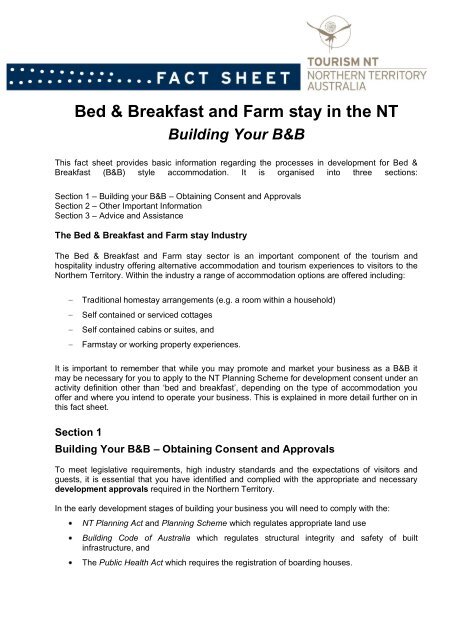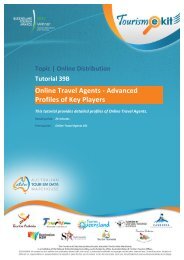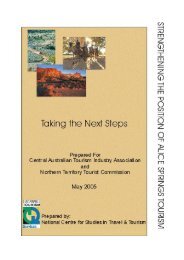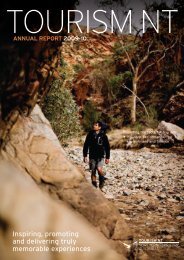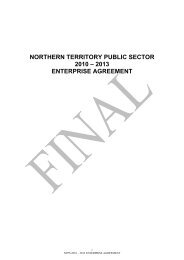Bed & Breakfast Fact Sheet - Tourism NT Corporate Site
Bed & Breakfast Fact Sheet - Tourism NT Corporate Site
Bed & Breakfast Fact Sheet - Tourism NT Corporate Site
Create successful ePaper yourself
Turn your PDF publications into a flip-book with our unique Google optimized e-Paper software.
<strong>Bed</strong> & <strong>Breakfast</strong> and Farm stay in the <strong>NT</strong><br />
Building Your B&B<br />
This fact sheet provides basic information regarding the processes in development for <strong>Bed</strong> &<br />
<strong>Breakfast</strong> (B&B) style accommodation. It is organised into three sections:<br />
Section 1 – Building your B&B – Obtaining Consent and Approvals<br />
Section 2 – Other Important Information<br />
Section 3 – Advice and Assistance<br />
The <strong>Bed</strong> & <strong>Breakfast</strong> and Farm stay Industry<br />
The <strong>Bed</strong> & <strong>Breakfast</strong> and Farm stay sector is an important component of the tourism and<br />
hospitality industry offering alternative accommodation and tourism experiences to visitors to the<br />
Northern Territory. Within the industry a range of accommodation options are offered including:<br />
Traditional homestay arrangements (e.g. a room within a household)<br />
Self contained or serviced cottages<br />
Self contained cabins or suites, and<br />
Farmstay or working property experiences.<br />
It is important to remember that while you may promote and market your business as a B&B it<br />
may be necessary for you to apply to the <strong>NT</strong> Planning Scheme for development consent under an<br />
activity definition other than ‘bed and breakfast’, depending on the type of accommodation you<br />
offer and where you intend to operate your business. This is explained in more detail further on in<br />
this fact sheet.<br />
Section 1<br />
Building Your B&B – Obtaining Consent and Approvals<br />
To meet legislative requirements, high industry standards and the expectations of visitors and<br />
guests, it is essential that you have identified and complied with the appropriate and necessary<br />
development approvals required in the Northern Territory.<br />
In the early development stages of building your business you will need to comply with the:<br />
<strong>NT</strong> Planning Act and Planning Scheme which regulates appropriate land use<br />
Building Code of Australia which regulates structural integrity and safety of built<br />
infrastructure, and<br />
The Public Health Act which requires the registration of boarding houses.
The Northern Territory Planning Act and the <strong>NT</strong> Planning Scheme<br />
The Northern Territory Planning Act (the Act) provides for appropriate and orderly planning and<br />
control of the use and development of land in the Northern Territory.<br />
The Act establishes the <strong>NT</strong> Planning Scheme (the Scheme) which provides for a development<br />
approval process and the establishment of the Development Consent Authority (DCA) which is<br />
appointed by the Minister for Lands and Planning.<br />
The DCA is responsible for implementing the land use policy, and administering the approval<br />
process which permits, prohibits, restricts or imposes conditions on a use or development of land.<br />
For more information, including DCA regional memberships and meeting dates, visit<br />
www.nt.gov.au/lands/planning/dca.<br />
The Planning Scheme defines certain development activities, outlines the developments allowed<br />
in zoned areas in the Northern Territory and contains specific and general clauses that must be<br />
complied with and addressed in planning your development and applying to the DCA.<br />
You will need to know the current zoning of your property and will also need to provide certain<br />
information to support your application which is outlined in Section 46 of the Planning Act. You<br />
can find a copy of the Act at www.nt.gov.au/lands/planning/scheme.<br />
You can access the zoning and planning rules for your property using the <strong>NT</strong> Department of<br />
Business and Employment’s Planning Scheme and Business Information Finder at<br />
http://nt.bli.net.au.<br />
Your development proposal and application should also address the general clauses of the<br />
Scheme. General clauses include general building heights, plot ratios, building and fencing<br />
setbacks, clearing of native vegetation and landscaping, parking requirements, signage<br />
specifications and other development controls.<br />
If you are intending to establish your B&B in the Jabiru town area your application will be subject<br />
to the Jabiru Town Plan and the consent of the Jabiru Town Development Authority. You can<br />
access a copy of the Jabiru Town Plan at http://www.nt.gov.au/lands/planning/scheme.<br />
The Department of Planning and Infrastructure offers assistance through the Development One<br />
Stop Shop which is a service to provide prospective applicants with the opportunity to gather<br />
feedback from relevant agencies prior to lodgement of a development application. This is to help<br />
you be informed, discuss and clarify agency requirements, ask questions and identify important<br />
issues before lodging an application.<br />
It is recommended that you make an appointment with a planner to get assistance in the<br />
preparation of your application. For more information or to make an appointment visit<br />
http://www.nt.gov.au/lands/planning/onestopshop.<br />
If you are intending to establish your B&B in the Darwin Municipal area you may also like to look<br />
at the Darwin City Council’s <strong>Bed</strong> and <strong>Breakfast</strong> Policy which guides the Council’s comments to<br />
the DCA on development applications.<br />
(http://www.darwin.nt.gov.au/documents/<strong>Bed</strong>And<strong>Breakfast</strong>Policy.pdf).<br />
2
Assessment of Your Application<br />
In assessing applications for B&B developments the DCA will give careful consideration to<br />
whether the proposed development is appropriate to the site and whether the development<br />
activity will have a negative impact on the residential amenity of the area or adjoining properties.<br />
The DCA will also use the definitions given to activities (Sect ion 3 of t he Planning Schem e)<br />
in considering uses for particular zones.<br />
You will need to decide whether your development<br />
1. Complies with the definition of a B&B as a dwelling (See Table A), or<br />
2. If you have multiple dwellings (See Table B), such as separate cabins or suites, whether<br />
you should apply under the definitions as a hostel, motel or caravan park.<br />
The definition of dwelling is:<br />
Dwelling means a building or part of a building designed, constructed or adapted<br />
as a self-contained residence.<br />
The definition of multiple dwellings is:<br />
Multiple dwellings means a building or group of buildings on a site which<br />
individually or collectively contain more than one dwelling (including serviced<br />
apartments) but does not include a dependant unit (a dependant unit is<br />
accommodation provided for the dependant of a resident of the single dwelling).<br />
The scheme does, however, allow the consent authority to approve an application for bed and<br />
breakfast accommodation that is not in accordance with these definitions if it is satisfied that the<br />
accommodation is appropriate to the site and providing that the development does not negatively<br />
impact on the residential amenity of adjoining and nearby property.<br />
Building Code of Australia<br />
Once you have obtained approval from the DCA for your development you will also need to<br />
consult your Building Certifier to ensure that you comply with the requirements of the Building<br />
Code of Australia (BCA) which defines certain classes of dwelling and their permitted use. A<br />
building permit will be required under the Northern Territory Building Act for any building work<br />
associated with a B&B including a change of use from a Class 1a to a Class 1b.<br />
This can be obtained from a <strong>NT</strong> registered building certifier. A list of Building Certifiers can be<br />
found at http://www.ntlis.nt.gov.au/building-practitioners/.<br />
A summary of the BCA building classes relevant to commercial accommodation is provided in the<br />
attached tables for your information.<br />
3
Public Health Act<br />
The Pub lic Healt h (Shop s, Board ing Houses, Host els and Hot els) Regulat ions require<br />
that commercial accommodation providers that accommodate more than 3 persons (not including<br />
the proprietor and his/her family) are registered as a boarding house.<br />
There are specific structural requirements that must be met and you should refer to the<br />
Regulations in the early stages of the development of your business. The Regulations can be<br />
found at http://www.health.nt.gov.au/Doing_Business_with_Us/Licensing.<br />
Table A and Table B, at the end of this <strong>Fact</strong> <strong>Sheet</strong>, are provided to help you decide how you will<br />
apply for development consent through the <strong>NT</strong> Planning Scheme, and to determine what other<br />
requirements you will need to meet to obtain all of the necessary approvals to proceed with your<br />
business.<br />
Section 2-<br />
Other Important Information<br />
There are other important sources of information and advice that you can access in developing<br />
your B&B business:<br />
Hosted Accommodation Australia Ltd<br />
Hosted Accommodation Australia Ltd. is the national peak industry organisation representing<br />
quality hosted accommodation: B&Bs; Farmstays; Guest Houses; Boutique Hotels; Cottages; and<br />
self contained accommodation.<br />
It provides a voice for the industry with all levels of government, the tourism industry and others. It<br />
sets industry standards; provides a wide range of member services; maintains a high-ranking<br />
website; seeks new markets for the industry; and assists and mentors newcomers in the<br />
development of their businesses.<br />
For more information please contact phone:1300 664 707 Email: admin@bbfaa.com.au\<br />
Website: www.bbfaa.com.au<br />
<strong>Tourism</strong> Accreditation<br />
As tourism continues to develop in Australia it is important that tourism operators are prepared<br />
and skilled to meet the expectations of tourists in regard to service delivery and quality of<br />
products.<br />
<strong>Tourism</strong> accreditation in the Northern Territory has been driven by industry to ensure the ongoing<br />
sustainability and best practices of local tourism operators, and identifies a minimum standard in<br />
business operation and customer service. <strong>Tourism</strong> Accreditation helps define core business<br />
activities and good business practices and is an important tool for you in developing and operating<br />
your B&B business. <strong>Tourism</strong> <strong>NT</strong>’s accreditation policy will result in appropriately accredited<br />
4
usiness being exclusively sold and promoted by <strong>Tourism</strong> <strong>NT</strong> from 1 July 2010. Business<br />
currently not accredited should address this at least three months prior to the cut off date.<br />
Information on this policy is available at www.tourismnt.com.au/nt/nttc/industry/accreditation.<br />
It is also advisable to become a member of the region’s tourism promotion organisation, either<br />
(www.tourismtopend.com.au) or (www.centralaustraliantourism.com) to ensure you have the best<br />
possible awareness of your product in the market place.<br />
Other Regulatory and Operational Issues<br />
Remember, once you are on your way to establishing your business you will also need to<br />
consider other regulatory requirements including:<br />
registering your business name under the Business Names Act<br />
compliance with the Fire and Emergency Act<br />
compliance with the Anti-Discrimination Act<br />
compliance with the Food Act if you are providing meals<br />
compliance with the Liquor Act if you are serving or selling alcohol<br />
compliance with the Workplace Health and Safety Act<br />
compliance with the Consumer Affairs and Fair Trading Act<br />
taxation and GST requirements<br />
Other operational issues you will need to consider are:<br />
public liability and general insurance<br />
business planning and risk management<br />
office management including reservation systems<br />
financial management and reporting<br />
marketing and promoting your business, and<br />
whether you will participate in an accommodation rating schemes such as the AAA Rating<br />
Scheme. For more information visit http://www.aaatourism.com.au/.<br />
Registering for and working through an accreditation program in partnership with <strong>Tourism</strong> <strong>NT</strong> will<br />
provide you with the tools, advice and support to meet most of these regulatory and operational<br />
needs (see contact details above).<br />
5
Section 3:<br />
Advice and Assistance<br />
For further advice and assistance contact:<br />
<strong>Tourism</strong> <strong>NT</strong><br />
Infrastructure and Investment Attraction<br />
Claire George<br />
76 The Esplanade<br />
DARWIN <strong>NT</strong> 0801<br />
Telephone: 08 8999 3836<br />
Department of Health and Families<br />
Environmental Health<br />
Barbara Klessa<br />
2nd Floor Casuarina Plaza<br />
PO Box 40596<br />
CASUARINA <strong>NT</strong> 0811<br />
Telephone: 08 89227363<br />
Department of Planning and Infrastructure<br />
Development Assessment Services<br />
Ground Floor Cavanagh House<br />
38 Cavanagh St<br />
Darwin <strong>NT</strong> 0800<br />
Telephone: 08 8999 6046<br />
Building Advisory Services<br />
Ground Floor Cavanagh House<br />
38 Cavanagh St<br />
Darwin <strong>NT</strong> 0800<br />
Telephone: 08 8999 6435<br />
Hosted Accommodation Australia Ltd.<br />
PO Box 422<br />
Eltham, Victoria 3095<br />
Telephone: 1300 664 707<br />
6
Definition under<br />
the Planning<br />
Scheme<br />
The definition of a<br />
<strong>Bed</strong> and <strong>Breakfast</strong><br />
under the Planning<br />
Scheme is<br />
temporary<br />
accommodation for<br />
travellers provided<br />
within a dwelling by<br />
the resident of that<br />
dwelling.<br />
7<br />
Table A - Applying for Consent to Operate a Traditional <strong>Bed</strong> and <strong>Breakfast</strong><br />
Specific Clause – <strong>NT</strong><br />
Planning Scheme<br />
*Clause 7.10<br />
A dwelling may be used<br />
for bed and breakfast<br />
accommodation where<br />
a) The dwelling is<br />
suitable for the use<br />
b) Not more than five<br />
guests are<br />
accommodated at a time<br />
in the dwelling<br />
c) No sign is displayed<br />
other than a business<br />
sign that is not more the<br />
0.5m2 in area<br />
*Subject to review –<br />
awaiting decision from<br />
Dept. Lands & Planning<br />
Can operate in the<br />
following<br />
Zones with DCA<br />
approval<br />
Single Dwelling Residential<br />
(SD)<br />
Multiple Dwelling<br />
Residential (MD)<br />
Medium Density<br />
Residential (MR)<br />
High Density Residential<br />
(HR)<br />
Caravan Parks (CV)<br />
Community Living (CL)<br />
Central Business (CB)<br />
Service Commercial (SC)<br />
Tourist Commercial (TC)<br />
Horticulture (H)<br />
Agriculture (A)<br />
Rural Residential (RR)<br />
Rural Living (RL)<br />
Rural (R)<br />
Heritage (HT)<br />
Water Management (WM)<br />
Future Development (FD)<br />
Township (T)<br />
Other regulations:<br />
Building Code of<br />
Australia<br />
Class 1: one or more buildings<br />
which in association constitute -<br />
(a) Class 1a - a single dwelling<br />
being -<br />
(i) a detached house; or<br />
(ii) one of a group of two or more<br />
attached dwellings, each being a<br />
building, separated by a fireresisting<br />
wall, including a row<br />
house, terrace house, town house<br />
or villa unit; or<br />
(b) Class 1b - a boarding<br />
house, guest house, hostel or the<br />
like<br />
(i) with a total area of all floors not<br />
exceeding 300 m2 measured over<br />
the enclosing walls of the Class 1b;<br />
and<br />
(ii) in which not more than 12<br />
persons would ordinarily be<br />
resident, which is not located above<br />
or below another dwelling or<br />
another Class of building other than<br />
a private garage.<br />
Public Health Act<br />
Public Health (Shops, Boarding<br />
Houses, Hostels and Hotels)<br />
Regulations<br />
Part IV of the Regulations requires that<br />
a boarding house must be registered<br />
with the Chief Health Officer.<br />
The definition of boarding house<br />
includes any house, licensed premises<br />
under the Liquor Act, lodging house,<br />
hostel, residential flat, motel, tent,<br />
caravan, building, structure, whether<br />
permanent or otherwise or any other<br />
premises, and any part thereof, in which<br />
3 or more persons, exclusive of the<br />
family of the proprietor thereof, are<br />
lodged or boarded for hire or reward<br />
from week to week or for more than a<br />
week.
8<br />
Table B – Applying for Consent to Operate a B&B Consisting of Multiple Dwellings<br />
Definition under the Planning<br />
Scheme<br />
Hostel includes boarding houses,<br />
guest houses, lodging houses and<br />
other premises used to provide<br />
boarding or<br />
lodging with communal toilet, ablution,<br />
dining or cooking facilities but does not<br />
include bed and breakfast<br />
accommodation or a group home.<br />
Motel means premises wholly or<br />
principally used for the<br />
accommodation of travellers and the<br />
vehicles used by them, whether or not<br />
the building is also used to provide<br />
meals to the travellers to members of<br />
the general public and whether or not<br />
the premises are licensed under the<br />
Liquor Act but does<br />
not include bed and breakfast<br />
accommodation.<br />
Caravan Park means land used<br />
for the parking of caravans or the<br />
erection or placement and use of tents<br />
or cabins for the purpose of providing<br />
accommodation.<br />
Can operate in the<br />
following Zones with DCA<br />
approval<br />
High Density Residential (HR)<br />
Caravan Parks (CV)<br />
Community Living (CL)<br />
Central Business (CB)<br />
Commercial (C)<br />
Service Commercial (SC)<br />
Tourist Commercial (TC)<br />
Development (D)<br />
Agriculture (HT)<br />
Water Management (WM)<br />
Township (T)<br />
High Density Residential (HR)<br />
Caravan Parks (CV)<br />
Central Business (CB)<br />
Commercial (C)<br />
Service Commercial (SC)<br />
Tourist Commercial (TC)<br />
Development (D) (WM)<br />
Future Development (FD)<br />
Township (T)<br />
Caravan Parks (CV)<br />
Tourist Commercial (TC)<br />
Agriculture (A)<br />
Water Management (WM)<br />
Future Development FD)<br />
Township (T)<br />
Other regulations:<br />
Building Code of Australia<br />
Class 3: a residential building, other that a building of<br />
class 1 or 2, which is a common place of long term or<br />
transient living for a number or unrelated persons,<br />
including –<br />
(a) a boarding house, guest house, hostel, lodging<br />
house or backpackers accommodation or<br />
(b) a residential part of a hotel or motel<br />
Class 3: a residential building, other that a building of<br />
class 1 or 2, which is a common place of long term or<br />
transient living for a number or unrelated persons,<br />
including –<br />
a) a boarding house, guest house, hostel, lodging<br />
house or backpackers accommodation or<br />
b) a residential part of a hotel or motel<br />
Class 3: a residential building, other that a building of<br />
class 1 or 2, which is a common place of long term or<br />
transient living for a number or unrelated persons,<br />
including –<br />
a) a boarding house, guest house, hostel, lodging<br />
house or backpackers accommodation or<br />
b) a residential part of a hotel or motel<br />
Other regulations:<br />
Health<br />
Part IV of the<br />
Regulations require a<br />
boarding house must be<br />
registered with the Chief<br />
Health Officer. The<br />
definition of boarding<br />
house includes any<br />
house, licensed<br />
premises under the<br />
Liquor Act, lodging<br />
house, hostel,<br />
residential flat, motel,<br />
tent, caravan, building,<br />
structure, whether<br />
permanent or otherwise<br />
or any other premises,<br />
and any part thereof, in<br />
which 3 or more<br />
persons, exclusive of<br />
the family of the<br />
proprietor thereof, are<br />
lodged or boarded for<br />
hire or reward from<br />
week to week or for<br />
more than a week.


